|
|
|
Sort Order |
|
|
|
Items / Page
|
|
|
|
|
|
|
| Srl | Item |
| 1 |
ID:
131415
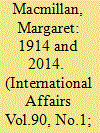

|
|
|
|
|
| Publication |
2014.
|
| Summary/Abstract |
The outbreak of the First World War remains a great historical puzzle and a source of concern, for if we do not understand how it came about we run the risk of stumbling into a similar catastrophe. This article draws parallels between the world of 1914 and the present. It starts with comfortable assumptions made by so many, then and now, that a major conflict was impossible or improbable and then looks at the paradox that globalization not only made the world more interdependent and linked, but also fostered intense local and national identities. It suggests factors that propelled Europe to war in 1914, including national rivalries, imperialism, the arms race and a shifting power balance between rising and declining powers, as well as ideologies and assumptions such as Social Darwinism and militarism, and points out that similar forces and ideas are present today. The article also stresses the dangerous complacency that can arise as a result of decision-makers having successfully dealt with a series of crises. European decision-makers also assumed that they could successfully use war as an instrument of policy and largely ignored or explained away the mounting evidence that the advantage in conflict was swinging to the defence. Again, as the author points out, there are disquieting parallels with the present.
|
|
|
|
|
|
|
|
|
|
|
|
|
|
|
|
| 2 |
ID:
185514
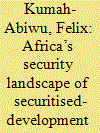

|
|
|
|
|
| Summary/Abstract |
Africa’s security landscape has been experiencing securitised-development practices through counterterrorism activities from donor countries engaged in the ‘Global War on Terror’ (GWOT). While some African governments continue to ‘benefit’ from the securitised-development agenda, critiques argue that there are human rights concerns that are connected to the practice of securitised-development. They have emphasised how some African governments and military actors involved in fighting the GWOT are also faced with human rights issues. To explore these issues, the article examines the securitised-development agenda in Kenya and Uganda and its impact on human rights. The article argues that the securitised-development practice is characterised by underlying contradictions involving the fight against terrorism and the accompanying human rights concerns in these countries.
|
|
|
|
|
|
|
|
|
|
|
|
|
|
|
|
| 3 |
ID:
025673


|
|
|
|
|
| Publication |
Hague, Muton, 1968.
|
| Description |
386p.
|
|
|
|
|
|
|
|
|
|
|
|
Copies: C:1/I:0,R:0,Q:0
Circulation
| Accession# | Call# | Current Location | Status | Policy | Location |
| 004655 | 355.0213/DOO 004655 | Main | On Shelf | General | |
|
|
|
|
| 4 |
ID:
123196


|
|
|
|
|
| Publication |
2013.
|
| Summary/Abstract |
CARTOGRAPHICAL CONCEPTIONS of Asia obscure what, in strategic terms, is a "Greater Asia." It stretches from eastern Iran through Central Asia and South Asia to Indonesia, and from the Aleutian Islands to Australia, encompassing the Russian Far East, China, Japan, the Korean Peninsula and Southeast Asia. It is connected by multifarious transactions, cooperative and adversarial, resulting from flows of trade and investment, energy pipelines, nationalities that spill across official borders, historical legacies that shape present perceptions, and shifting power ratios, within and among states.
|
|
|
|
|
|
|
|
|
|
|
|
|
|
|
|
| 5 |
ID:
161493
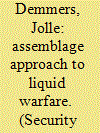

|
|
|
|
|
| Summary/Abstract |
The Western state-led turn to remote forms of military intervention as recently deployed in the Middle East and across Africa is often explained as resulting from risk aversion (avoidance of ground combat), materiality (‘the force of matter’) or the adoption of a networked operational logic by major military powers, mimicking the ‘hit-and-run’ tactics of their enemies. Although recognizing the mobilizing capacities of these phenomena, we argue that the new military interventionism is prompted by a more fundamental transformation, grounded in the spatial and temporal reconfiguration of war. We see a resort to ‘liquid warfare’ as a form of military interventionism that shuns direct control of territory and populations and its cumbersome order-building and order-maintaining responsibilities, focusing instead on ‘shaping’ the international security environment through remote technology, flexible operations and military-to-military partnerships. We draw upon assemblage as a heuristic device and the case of the US Africa Command (AFRICOM) to flesh out the complex and fluid nature of liquid warfare and the ways by which power operates across space. We outline how the forging of a transnational military assemblage in the name of ‘hunting Kony’ allowed for the buildup of an archipelago of military bases and operational capabilities across Africa, which serve as hubs for the monitoring, disrupting and containment of potential risks and dangers.
|
|
|
|
|
|
|
|
|
|
|
|
|
|
|
|
| 6 |
ID:
157923


|
|
|
|
|
| Summary/Abstract |
The relationship between private security professionals and the military in Israel is complex. While there is growing attention to the fact that security and military actors and their activities are becoming increasingly blurred, the Israeli case shows something different. In this ground-up analysis of the relationship between private security practices and the military, I investigate its constant negotiation by private security professionals through their identification with and differentiation from the military, whereby they reconfigure the meaning of military capital. This identity work should be understood, I propose, within the strongly militarist context of Israeli society, where military capital is highly valued. I argue that actors who exit the military system feel the need to demonstrate the added value of their work in the private sector in order for it to gain value in the light of the symbolic capital given to the military. I analyse these processes as leading to a new kind of militarism, which includes security skills and ideas about professionalism. Such an approach sheds new light on the ways in which security actors can actively reconfigure the workings of military capital in and outside the nation-state and produce a different kind of militarism.
|
|
|
|
|
|
|
|
|
|
|
|
|
|
|
|
| 7 |
ID:
103956
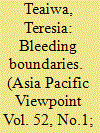

|
|
|
|
|
| Publication |
2011.
|
| Summary/Abstract |
This introduction to an Asia Pacific Viewpoint special section on militarism and gender in the Pacific argues that gendered analyses are crucial to understanding processes of militarization, and that multidisciplinary and interdisciplinary approaches are integral in that effort. The introduction also provides background to the articles, outlining their origin in a workshop on militarism and gender in the Pacific held in Wellington, New Zealand in 2009, and its subsequent iteration in sessions at the Oceanic Conference of International Studies in 2010. The special section constitutes the first publication of a permanent working group on militarism and gender in the Pacific with an international, multidisciplinary membership.
|
|
|
|
|
|
|
|
|
|
|
|
|
|
|
|
| 8 |
ID:
157925
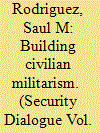

|
|
|
|
|
| Summary/Abstract |
In late 2016, the Colombian government and the Revolutionary Armed Forces of Colombia signed a peace agreement to bring an end to an internal war in Colombia that had lasted more than 50 years. During this process, pro-military attitudes within Colombian society that called for a hardline solution and rejected the peace agreement were highly visible, revealing the extent to which militarism had been embedded in Colombia over the years. This embedding of militarism had been enabled by the country’s many years of chaos and the use of counterinsurgency forms of warfare, which over the years had led civilian elites to adopt a militaristic approach to countering threats. In this article, I will examine key issues related to the central role of militarism and militarization in the scenario of violence and insecurity in Colombia, drawing on mid- and short-term historical perspectives, to highlight what I refer to as the country’s ‘civilian militarism’. First, I discuss how the main conceptual framing regarding militarism, militarization, and security applies to the Colombian case. Second, I describe and analyze the origin of civilian militarism in the context of the struggle between Colombia’s traditional political parties, and the militarization of the police and the intertwining of its role with that of the army as a legacy of that time. Third, I briefly examine how various presidential programs have embedded the concept of security in the 1990s and thereafter, though this is seen as a façade to enable the unfolding of a military approach to countering threats over the years, and how mandatory military service was used until recently as a tool to bolster support for militarism among everyday people.
|
|
|
|
|
|
|
|
|
|
|
|
|
|
|
|
| 9 |
ID:
048812


|
|
|
|
|
| Publication |
London, Frank Cass and Co. Ltd., 1994.
|
| Description |
vii,327p.
|
| Standard Number |
071464563X
|
|
|
|
|
|
|
|
|
|
|
|
Copies: C:1/I:0,R:0,Q:0
Circulation
| Accession# | Call# | Current Location | Status | Policy | Location |
| 039090 | 355.02/JAB 039090 | Main | On Shelf | General | |
|
|
|
|
| 10 |
ID:
157921
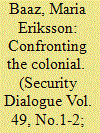

|
|
|
|
|
| Summary/Abstract |
Drawing on postcolonial theory, this article queries into the ways in which the concepts of militarism/militarization and securitization are applied to ‘African’ contexts. We highlight the selective nature of such application and probe into the potential reasons for and effects of this selectiveness, focusing on its signifying work. As we argue, the current selective uses of securitization and militarism/militarization in ‘Africa’ scholarship tend to recreate troublesome distinctions between ‘developed’ versus ‘underdeveloped’ spaces within theory and methodology. In particular, they contribute to the reproduction of familiar colonially scripted imagery of a passive and traditional ‘Africa’, ruled by crude force and somehow devoid of ‘liberal’ ideas and modes of governing. Yet we do not suggest simply discarding ‘selectiveness’ or believe that there are any other easy remedies to the tensions between universalism and particularism in theory application. Recognizing the ambivalent workings of colonial discourse, we rather contend that any attempts to trace the colonial into the present use of the concepts of securitization and militarism/militarization need to acknowledge the problematic nature of both discourses of ‘African’ Otherness and those of universalism and sameness.
|
|
|
|
|
|
|
|
|
|
|
|
|
|
|
|
| 11 |
ID:
161543
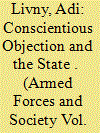

|
|
|
|
|
| Summary/Abstract |
The abundant writing on conscientious objection (CO) had kept one significant actor rather neglected—the state. Relatively unexplored is the question of how democracies shape their policies toward CO. This article wishes to address this gap, focusing in particular on states that maintain conscription, and examining what accounts for their different responses to CO. Based on the Israeli case study, while drawing on comparative insights from The Federal Republic of Germany and Switzerland during the Cold War, I argue that states’ treatment of CO depends primarily on the military’s status and the type of roles assigned to conscription. States in which these roles are mainly functional, and the military does not enjoy, accordingly, a high symbolic status will be more inclined to formally recognize CO than states in which the military fulfills civilian–social roles and enjoys a high symbolic status. Lack of recognition, however, does not necessarily imply harshness; states of the latter sort might nonetheless accommodate CO through unofficial means. Thus, when discussing the policy towards CO a distinction is ought to be made between accommodation and recognition.
|
|
|
|
|
|
|
|
|
|
|
|
|
|
|
|
| 12 |
ID:
098466
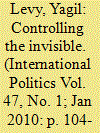

|
|
|
|
|
| Publication |
2010.
|
| Summary/Abstract |
Militaries work intentionally, visibly and in a politically controlled manner to fulfill their formal assignments as the professional perpetrators of external violence on behalf of the state. It is to this level of military action that the existing literature on the civilian control of the military is confined. However, through the intensive interaction between the military and civilians, the effects of formally controlled military activity go beyond the professional domain and are felt in civilian areas, where, in the long term, military activity helps create structures of unequal power relations. Given its structural dimension, this aspect of the military is not necessarily or immediately visible to the main agents involved; hence, it is divorced from effective civilian control. I conceptualize this neglected type of control as effectual control, distinct from the theoretically well-established notion of operational control. This paper theorizes the essence of effectual control.
|
|
|
|
|
|
|
|
|
|
|
|
|
|
|
|
| 13 |
ID:
164436


|
|
|
|
|
| Summary/Abstract |
What are the politics of, and prospects for, contemporary weapons control? Human rights and humanitarian activists and scholars celebrate the gains made in the UN Arms Trade Treaty as a step towards greater human security. Critics counter that the treaty represents an accommodation with global militarism. Taking the tensions between arms transfer control and militarism as my starting point, I argue that the negotiating process and eventual treaty text demonstrate competing modes of militarism. Expressed in terms of sovereignty, political economy, or human security, all three modes are underpinned by ongoing imperial relations: racial, gendered, and classed relations of asymmetry and hierarchy that persist despite formal sovereign equality. This means human security is a form of militarism rather than the antithesis of it. Drawing on primary sources from negotiations and participant observation with actors involved in the campaign for the ATT, the argument challenges the idea that human security has scored a victory over militarism. It also complicates our understanding of the nature of the accommodation with it, demonstrating the transformation as well as entrenchment of contemporary militarism. The argument reframes the challenges for controlling weapons circulation, placing the necessity for feminist, postcolonial anti-militarist critique front and centre.
|
|
|
|
|
|
|
|
|
|
|
|
|
|
|
|
| 14 |
ID:
142833
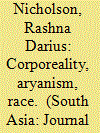

|
|
|
|
|
| Summary/Abstract |
Recent scholarship has problematised the ‘impact-response’ theory that ideas such as Aryanism, eugenics and militarism were merely imported from a European context into a South Asian one. This paper delineates a longer trajectory of the relationship between corporeal language and communal identity through a focus on the Parsi community of western India. As early as 1853, reformist Parsis enacted modes of ancient Kayānī virility in the gymnasium and theatre to redefine notions of communal identity that drew simultaneously from Enlightenment precepts and a mythic Aryan heritage discovered by Orientalists. Subsequently, the confluence of a loss of numerical, financial and political strength, and the popularisation of the ideas of Darwin and Mendel, prompted a shift in ethnic and semantic thinking, whereby the language of corporeality was co-opted by the orthodox faction to justify the bifurcation of religion and race. Consequently, Parsis, in the midst of a rising Hindu nationalist movement, called not only for the revival of Persian epic theatre, a Parsi militia, the exclusion of ‘half-castes’ from the community and the castration of ‘mentally defective’ community members, but also for a renewal of ties to Iran and a separate state of Parsistan.
|
|
|
|
|
|
|
|
|
|
|
|
|
|
|
|
| 15 |
ID:
159783
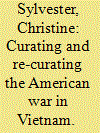

|
|
|
|
|
| Summary/Abstract |
The American war in Vietnam killed 58,000 US military personnel and millions of people on the ground, creating a troubling war legacy that has been ‘resolved’ in the USA through state strategies to efface military mortalities. Drawing on Charlotte Heath-Kelly’s work addressing mortality denied or ignored in the field of international relations and that of Andrew Bacevich and Christian Appy on American militarism, I explore the Vietnam Veterans Memorial in Washington, DC, as a site of war re-curations that refuse the effacement of mortality and disrupt the militarist myths that sustain it – namely, that America is renewed and revitalized through war, and that soldiers live on as American heroes when they sacrifice for the country. With the Vietnam Syndrome long since replaced by insistence on loving all soldiers, even if not all the country’s wars, the Vietnam Veterans Memorial is dedicated to remembering those who were not publicly acknowledged for fighting and dying in America’s failed war. Assemblages of pictures, letters, and other items that a community of loss leaves at the Memorial re-curate the war by showing the lingering pain that war mortality inflicts on those who experience it decade upon decade. Taken together, the objects of war shown at the Vietnam Veterans Memorial and collected each evening put mortality at the heart of war experience. The Memorial is therefore a key location of knowledge that challenges militarist appeals and state effacements in favor of what Viet Thanh Nguyen calls ‘just memory’ of war.
|
|
|
|
|
|
|
|
|
|
|
|
|
|
|
|
| 16 |
ID:
040736
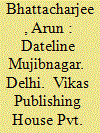

|
|
|
|
|
| Publication |
DelhI, Vikas Publishing House Pvt. Ltd, 1973.
|
| Description |
ix, 256p.hbk
|
| Standard Number |
706902432
|
|
|
|
|
|
|
|
|
|
|
|
Copies: C:1/I:0,R:0,Q:0
Circulation
| Accession# | Call# | Current Location | Status | Policy | Location |
| 011475 | 954.92/BHA 011475 | Main | On Shelf | General | |
|
|
|
|
| 17 |
ID:
165002
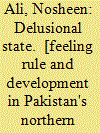

|
|
|
|
|
| Publication |
New Delhi, Cambridge University Press, 2019.
|
| Description |
xiii, 304p.: maps, figureshbk
|
| Standard Number |
9781108497442
|
|
|
|
|
|
|
|
|
|
|
|
Copies: C:1/I:0,R:0,Q:0
Circulation
| Accession# | Call# | Current Location | Status | Policy | Location |
| 059623 | 321.023/ALI 059623 | Main | On Shelf | General | |
|
|
|
|
| 18 |
ID:
157926
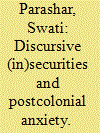

|
|
|
|
|
| Summary/Abstract |
This article queries the intimate relationship between militarism and the state, which is seen as the by-product of ‘postcolonial anxiety’ (Krishna, 1999) related to the survival of the nation-state in the Third World. This anxiety enables militarism at various levels of governance and state interventions in the everyday lives of the citizenry. The article engages with the historical trajectory of the Indian state to argue that its ‘postcolonial anxiety’ engenders militarism not in the immediate aftermath of independence from colonial rule, as in other postcolonial states, but as an anomaly since the end of the Cold War and the advent of globalization. The Indian state rejected militarism immediately after independence, but subsequently used it sporadically to deal with armed insurgencies in the 1970s and 1980s. The popular endorsement of militarism in India coincides with the globalized world order of the 1990s, the move to democratize ‘security’ in discourse and practice, and the adoption of neoliberal developmentalism to ‘catch up’ with the ‘modern’ trajectory of the European nation-states. I argue that this has led to ‘excessive militarism’ that thrives on the shared consensus between the state and citizens that security is a collective enterprise in which the material and affective labour of militarism must be performed by both sides. Citizens embrace military logics and military ethos, both to contest the state’s violence and to confer legitimacy on the state and secure development benefits. The article concludes that militarism opens up new spaces for understanding the complex statebuilding processes of postcolonial societies, the fraught and textured relationship between the state and citizens, and the constant tensions and negotiations between civilian lives and military culture.
|
|
|
|
|
|
|
|
|
|
|
|
|
|
|
|
| 19 |
ID:
151128
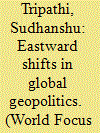

|
|
|
|
|
| Summary/Abstract |
As global geo-politics pivots to East, the emerging scenario offers good prospects as well as tough challenges because both India and the US are competing with each other to steal the show in the East against the backdrop of remarkable economic progress, though the rising expansionist-militarist and assertive policies of China and the discriminatory policies pursued by the US in the region are the some of the serious concerns as regards peace and stability of the region. Being closely connected with the East Asia, India has also been pursuing the region under its Look East Policy since early 1990’s which has now evolved into a comprehensive strategic engagement and robust security architecture. But instead of playing competing roles, both should jointly contribute towards the common cause of promoting peace, prosperity and security of the region.
|
|
|
|
|
|
|
|
|
|
|
|
|
|
|
|
| 20 |
ID:
025968


|
|
|
|
|
| Publication |
New Delhi, Allied Publishers, 1984.
|
| Description |
xii, 108p.
|
|
|
|
|
|
|
|
|
|
|
|
Copies: C:1/I:0,R:0,Q:0
Circulation
| Accession# | Call# | Current Location | Status | Policy | Location |
| 025801 | 355.0213/MIS 025801 | Main | On Shelf | General | |
|
|
|
|
|
|
|
|
|